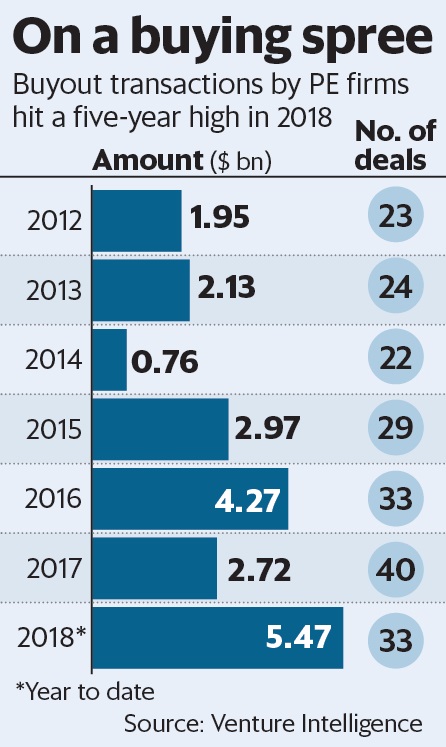Buyout transactions by private equity (PE) firms in India rose to $5.5 billion in 2018, the highest in five years, marking a shift in strategy for PE investors who had so far largely bought minority stakes.
Private equity buyouts this year are also double that of 2017’s buyout deals worth $2.7 billion, according to data from Venture Intelligence.
One of the large private equity buyouts that happened this year is Australian infrastructure group Macquarie’s purchase of 648km of national highways for $1.4 billion. This is followed by retailer Vishal Mega Mart’s acquisition by Kedaara Capital and Partners Group for $734 million, Greenko Energy Holdings that was acquired for $450 million by Singapore’s sovereign investment fund GIC and Abu Dhabi Investment Council. Out of 23 buyout deals in the first six months, seven worth $2.3 billion were in the infrastructure and real estate space.
The share of buyouts in the overall PE/VC investment pie in India is projected to grow progressively, driven by increase in funds available with PE investors and as more and more enabling conditions emerge, according to experts.
“Finding the right people to grow your business beyond a certain limit becomes difficult after a point. In that case, selling it off to a private equity investor who knows your business and has appetite makes sense,” said Dhanpal Jhaveri, managing partner, Everstone Group, which has $4 billion in assets under management.
Succession planning is another big enabler for private equity buyouts. Plus, selling one’s business does not carry a huge stigma now as it did earlier. “Unlike even 10 years back, today it is not taboo to sell your business if you do not have an heir,” Jhaveri said. “In such a case, selling it outside the family but to an expert who may know the business well, such as a PE investor, may make sense.”
The trend also indicated the willingness of private equity firms to get their hands dirty and run a business, said Sasha Mirchandani, founder and managing partner of Kae Capital, an early-stage venture fund. “I think this trend started when Blackstone acquired CMS in 2008,” he said, referring to the purchase of a 55% stake in Mumbai-based CMS Computers by the Blackstone Group. Blackstone sold the company in 2015 to Baring Private Equity for about ₹2,000 crore. “Once companies see a big deal like this happen and work successfully, it gives them confidence to go through with it themselves,” said Mirchandani.
Experts said that in some cases, as an industry reaches maturity or enters a consolidation phase, slowing growth prompts some of the mid-tier players to part with majority stakes in lieu of funds to grow the business inorganically as opposed to going solo in a fiercely competitive environment in a sub-scale manner. “In a competitive environment, if you are not able to expand beyond a certain point, you may be better off selling it, maybe even to a PE,” said Jhaveri at Everstone Capital.
Moreover, private equity funds, with their global reach to access markets, professional management and ability to infuse capital, are better suited for the opportunity. This often becomes a win-win situation as promoters are also generally happy to piggy back with a residual minority stake as they benefit from the disproportionate returns generated.
The traditional role of a private equity firm- as a financier, also positions them to understand operations of the business, they say. “Evaluating a business financially also means evaluating it operationally. It makes the PE firms understand the business better,” said Jhaveri.
A September EY report focusing on trends in the private equity space during the first half of this year said, “Buyouts are expected to be one of the major trends of the Indian PE/VC sector in the years to come. From a quarterly perspective, the first half of 2018 emerged as the best quarter for buyouts in terms of both sales and volume, with $2.8 billion recorded across 13 deals.”
Source: Mint
